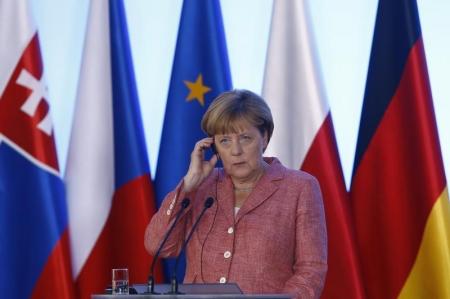
By Madeline Chambers and Michael Nienaber
BERLIN (Reuters) – Leading allies of German Chancellor Angela Merkel warned on Thursday that populists would pose a problem for Europe unless mainstream politicians came up with answers after Donald Trump’s victory in the U.S. presidential election.
Trump’s win has encouraged right-wing parties in Austria, France and the Netherlands, among others. A Politbarometer poll for broadcaster ZDF showed 82 percent of Germans viewed it as bad or very bad, and 65 percent expected relations with the United States to deteriorate under Trump’s presidency.
“Demagogic populism is not only a problem in America,” Finance Minister Wolfgang Schaeuble told Bild daily. “Elsewhere in the West, too, the political debate is in an alarming state.”
Merkel is widely expected to stand for a fourth term in an election next September and although her conservatives are roughly 10 points ahead of their nearest rivals, her open-door migrant policy has angered many voters.
The right-wing Alternative for Germany (AfD), which has embraced tough anti-immigrant rhetoric, is siphoning supporters from the bigger parties. Founded less than four years ago, it now has seats in more than half of Germany’s state assemblies.
Schaeuble said politicians had to respond by being more inclusive. He later told a group of bankers that Trump’s calls for Europe to shoulder more responsibility for its own defence and security needs would have consequences.
“We Europeans are probably going to have to continue down the path of increasingly doing the job on our own,” he said.
Hans-Peter Friedrich, a conservative from Merkel’s Bavarian sister party, told Bild that voters felt they had no control over things, from European Central Bank policy to immigration. “If there are no answers provided by the main parties in our country, they will turn to populists,” he said.
EU Commissioner Guenther Oettinger, also a senior conservative, said the U.S. election was a warning for Germany.
“Things are getting simplified, black or white, good or bad, right or wrong. You can ask simple questions, but one should not give simple answers,” Oettinger told Deutschlandfunk radio.
Even some companies pointed to risks for business in Europe’s biggest economy. Siemens (SIEGn.DE: Quote) CEO Joe Kaeser told reporters: “The rapid rise of political and social populism and accelerating global migration are causes of concern. As a result, uncertainty continues to dominate our lives.”
The AfD, polling at around 13 percent, has seized on Trump’s victory, saying his message resonates in Germany.
“The issues that moved the detached middle class in America to vote for Trump are issues we face in Europe,” AfD chief Frauke Petry told MDR radio, pointing to tax and migration.
(Additional reporting by Andreas Rinke and Georgina Prodhan; Writing by Madeline Chambers; Editing by Mark Trevelyan)